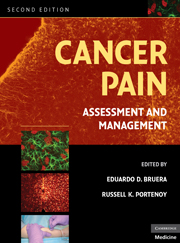Book contents
- Frontmatter
- Contents
- Contributors
- Preface
- SECTION I MECHANISMS AND EPIDEMIOLOGY
- SECTION II EPIDEMIOLOGY AND SYNDROMES
- SECTION III ASSESSMENT
- SECTION IV PHARMACOLOGICAL TREATMENT
- SECTION V OTHER INTERVENTIONAL STRATEGIES
- SECTION VI REHABILITATION AND PSYCHOLOGICAL INTERVENTIONS
- SECTION VII THE ROLE OF ANTINEOPLASTIC THERAPIES IN PAIN CONTROL
- SECTION VIII PAIN IN SPECIAL POPULATIONS
- SECTION IX DIFFICULT PAIN PROBLEMS
- SECTION X SYSTEMS OF CARE
- Index
- Plate section
Preface
Published online by Cambridge University Press: 06 July 2010
- Frontmatter
- Contents
- Contributors
- Preface
- SECTION I MECHANISMS AND EPIDEMIOLOGY
- SECTION II EPIDEMIOLOGY AND SYNDROMES
- SECTION III ASSESSMENT
- SECTION IV PHARMACOLOGICAL TREATMENT
- SECTION V OTHER INTERVENTIONAL STRATEGIES
- SECTION VI REHABILITATION AND PSYCHOLOGICAL INTERVENTIONS
- SECTION VII THE ROLE OF ANTINEOPLASTIC THERAPIES IN PAIN CONTROL
- SECTION VIII PAIN IN SPECIAL POPULATIONS
- SECTION IX DIFFICULT PAIN PROBLEMS
- SECTION X SYSTEMS OF CARE
- Index
- Plate section
Summary
The years since the publication of the first edition of this volume have witnessed many changes that together may affect the epidemiology, nature, impact, and management of cancer-related pain. The global prevalence of cancer continues to rise, and in most countries, the disease presents as an incurable illness characterized by high prevalence of pain. In developed countries, studies continue to reveal poor assessment, undertreatment, and problems with drug availability or health services delivery that compromise best practice. Although scientific understanding of pain pathophysiology and concurrent elucidation of the multiple systems underlying nociception and pain modulation offers great promise for therapeutics in the future, the community of health professionals continues to struggle with a prevalence and impact of cancer pain far greater than it should be. The rapid development of palliative care in much of the world has increased awareness of the problem and, in some countries, has enhanced access to specialist pain management, but most patients in need do not have access. Without question, there continues to be a huge burden on individuals, on families, and on society at large from inadequately treated cancer pain.
Although a relatively high proportion of patients with pain can be made more comfortable using easily acquired skills in pharmacotherapy, the larger problem requires a deeper understanding of the nature of pain and the broader range of therapies.
- Type
- Chapter
- Information
- Cancer PainAssessment and Management, pp. xi - xiiPublisher: Cambridge University PressPrint publication year: 2009



